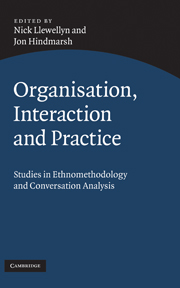Book contents
- Frontmatter
- Contents
- List of contributors
- Preface
- Part I Orientations
- Part II Studies
- 3 A kind of governance: rules, time and psychology in organisations
- 4 On the reflexivity between setting and practice: the ‘recruitment interview’
- 5 The situated production of stories
- 6 Orders of bidding: organising participation in auctions of fine art and antiques
- 7 Some major organisational consequences of some ‘minor’, organised conduct: evidence from a video analysis of pre-verbal service encounters in a showroom retail store
- 8 The work of the work order: document practice in face-to-face service encounters
- 9 The interactional accomplishment of a strategic plan
- 10 Peripherality, participation and communities of practice: examining the patient in dental training
- List of references
- Index
8 - The work of the work order: document practice in face-to-face service encounters
Published online by Cambridge University Press: 20 May 2010
- Frontmatter
- Contents
- List of contributors
- Preface
- Part I Orientations
- Part II Studies
- 3 A kind of governance: rules, time and psychology in organisations
- 4 On the reflexivity between setting and practice: the ‘recruitment interview’
- 5 The situated production of stories
- 6 Orders of bidding: organising participation in auctions of fine art and antiques
- 7 Some major organisational consequences of some ‘minor’, organised conduct: evidence from a video analysis of pre-verbal service encounters in a showroom retail store
- 8 The work of the work order: document practice in face-to-face service encounters
- 9 The interactional accomplishment of a strategic plan
- 10 Peripherality, participation and communities of practice: examining the patient in dental training
- List of references
- Index
Summary
Introduction
A critical feature – and resource – of many face-to-face service encounters is a ubiquitous bureaucratic document, the ‘standard form’ (see especially Suchman and Whalen 1994). But despite Max Weber's classic observations of the crucial role played by written documents (‘the files’) and the work of those who generate and administer them (‘subaltern officials and scribes of all sorts’) in all matters of organisational business (Weber 1978: vol. II, 957), study of the functions and uses of documents in modern organisations, whether paper or electronic, has been largely neglected by the human sciences. Strangely, this has even been the case for studies of formal organisations and bureaucracies, which rarely make more than a passing reference to any actual documenting, reading or filing activities. And this is despite the fact that from the invention of the first writing systems in the late fourth millennium BCE, and especially from the printing revolution that began in early modern Europe (Eisenstein 1983) and continues to this day, written documents were absolutely crucial to the co-ordination of many people across time and space by rendering information concrete and readily distributable (see especially Giddens 1979, 1987).
In this chapter, we undertake a detailed empirical examination of how documents enter into the concerting and co-ordinating of organisational activity and, in doing so, how this opens up and ties locally achieved co-ordinative practices into courses of action beyond a particular interaction.
Information
- Type
- Chapter
- Information
- Organisation, Interaction and PracticeStudies of Ethnomethodology and Conversation Analysis, pp. 172 - 197Publisher: Cambridge University PressPrint publication year: 2010
Accessibility standard: Unknown
- 22
- Cited by
